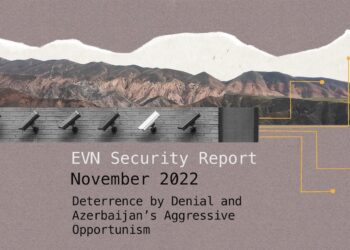
The International Criminal Court (ICC) was created with the promise “to put an end to impunity for perpetrators” of crimes that “shock the conscience of humanity.” Some have characterized the creation of the ICC as a “revolutionary paradigmatic change in our conceptions of international law,” as individuals –– not just states –– became subjects to prosecution for international crimes. The disparity between the Court’s promise and its achievements thus far, however, is significant and evidenced by the magnitude and scope of atrocity crimes left unremedied despite proclamations of “Never Again” after the Holocaust. Following the 2020 Artsakh War, calls for Armenia’s ratification of the Rome Statute of the ICC –– the treaty that established the Court –– have gained momentum. This warrants renewed attention to the promise and complexities of the world’s only permanent international criminal court.
Jurisdiction of the Court
To ascertain the scope of the ICC’s authority, it’s imperative to identify the specific crimes and preconditions that trigger the Court’s jurisdiction. According to the Rome Statute, the Court’s mandate is limited to four specific crimes that are “of concern to the international community as a whole” — the crime of genocide, war crimes, crimes against humanity and the crime of aggression. For the 123 countries that are parties to the Rome Statute, the Court may exercise jurisdiction only vis-a-vis crimes committed after the Statute entered into force. In other words, the Court’s jurisdiction does not extend over crimes committed prior to the ratification of the Statute, even if they fall within the Court’s mandate.
Three scenarios can trigger the Court’s jurisdiction: when an investigation is launched by the Prosecutor, when a situation is referred to the Office of the Prosecutor by a State Party and when it is referred by the UN Security Council acting under Chapter VII of its Charter. The fact that the UN Security Council can refer a situation to the Court gives an incredible political undertone to the overall process, considering that of the five permanent member states of the Council, only France and the United Kingdom have ratified the Statute, while Russia, China and the United States remain vocal critics of the Court. Article 12 of the Statute further requires the Court to exercise jurisdiction only over cases where the crime has occurred either on the territory of a State Party or was committed by a national of a State Party. Thus, even if a national of a non-State Party commits a crime on the territory of a State Party, they can still be prosecuted by the Court. The preconditions introduced in Article 12, however, do not apply to referrals by the Security Council, in which case the Court can still exercise jurisdiction in relation to a situation irrespective of the territorial or nationality limitations.
Article 12(3) of the Statute also gives states that are not parties to the Statute the prerogative to accept the Court’s jurisdiction and cooperate with the Court to potentially have investigations launched into circumstances occurring on their territory. Ukraine, for instance, which has not ratified the Rome Statute, has twice exercised its prerogative under the Statute and accepted the Court’s jurisdiction over alleged crimes committed on its territory both during the 2013-2014 Maidan protests and from 2014 onwards for addressing Russia’s occupation of Crimea and ongoing Russian military aggression. In March 2022, following a record-breaking 43 state referrals, the Office of the Prosecutor of the ICC announced an investigation into Ukraine’s claims, making it the second investigation launched in the post-Soviet space after Georgia.
When Does the ICC Open Investigations?
Since its establishment in 2002, the Court has launched 17 investigations, none of which have been closed yet. Based on those investigations, 31 cases have been heard in the Court and judges of the Court have issued 10 convictions and four acquittals. Before an investigation into a situation is launched, a number of criteria are assessed to determine the Court’s jurisdiction and admissibility of potential cases.
Complementarity
The ICC is a court of last resort that was established to supplement –– not supplant the jurisdiction of national courts over international crimes. As stipulated in Article 1 of the Rome Statute, ICC is “complementary to national criminal jurisdictions.” In contrast, both the International Criminal Tribunal for Rwanda (ICTR) and the International Criminal Tribunal for the former Yugoslavia (ICTY), the first two international ad hoc criminal tribunals established in the 1990s, enjoyed primacy over domestic courts. The purpose of the principle of complementarity is reflected in Article 17 of the Rome Statute, which requires the Court to deem a case inadmissible when it is being “investigated or prosecuted by a State which has jurisdiction over it, unless the State is unwilling or unable genuinely” to carry out the proceedings. In other words, national proceedings take precedence over the international ones. The principle of complementarity can also be viewed as a measure aimed at alleviating the Court’s monumental mandate, since “putting an end to impunity” for all is practically impossible. The ICC’s 2022 annual budget, for example, amounted to over 154 million Euro. For comparison, the 2010-2011 budget allocated to the ICTY, which only dealt with war crimes committed during the Balkan wars, amounted to 286 million US Dollars.
Some of the recent cases heard before the ICC, however, have challenged the long-standing assumptions about how complementarity should work. The case of Simone Gbagbo, the first lady of Cote d’Ivoire, is a case in point. When in October, 2011, the Pre-Trial Chamber of the Court opened an investigation into Cote d’Ivoire’s 2010-2011 post-election violence, it issued arrest warrants against President Laurent Gbagbo, the President’s political ally Charles Ble Goude, and the first lady. Although Cote d’Ivoire surrendered the first two, it refused to hand over Simone Gbagbo arguing that she would be prosecuted by a domestic court. Whereas the Office of the Prosecutor intended to prosecute Gbagbo for crimes against humanity, the Ivorian court convicted her for ordinary domestic crimes, such as disturbing the peace, organizing armed gangs and undermining state security.
Authors such as Kevin Heller, put forward and defend the principle of “radical complementarity,” which implies that as long as a state is making a genuine effort to bring a suspect to justice, the ICC should find their case inadmissible, regardless of the case or the prosecutorial strategy the state pursues. In accordance with the principle of radical complementarity, the case of Simone Gbagbo should have been declared inadmissible. The Office of the Prosecutor, however, found her case admissible with the justification that the charges brought during national proceedings were not the same.
Gravity
Another consideration that determines the admissibility of a case before the ICC is gravity. Article 17 of the Statute stipulates that to satisfy the admissibility criteria of the Court, a case, inter alia, will need to be of a sufficiently grave nature. According to regulation 29(2) of the Regulations of the Office of Prosecutor, the gravity of the situation is assessed based on a few factors, including the scale of the damage caused, the nature of crimes, the manner of commission and the impact on the victim population. The case of Mavi Marmara is an example of a case that was knocked out of the preliminary investigation stage on the basis of not being of sufficient gravity to justify further action by the Court. A humanitarian aid flotilla that was bound for the Gaza Strip was intercepted by members of the Israeli Defense Forces, which ultimately resulted in the death of ten Turkish nationals, while 50 others were injured. Based on both qualitative and quantitative considerations assessed, the Office of the Prosecutor concluded that cases potentially arising from the investigation were not of sufficient gravity.
Prosecutorial Discretion
Prosecutorial discretion also plays a key role in the selection and prioritization of cases that end up being investigated and prosecuted by the Court. A policy paper published during the tenure of the former Prosecutor Fatou Bensouda, identifies considerations that guide the selection of incidents and persons to be investigated and prosecuted by the Court. The rather selective approach towards case selection seems reasonable considering that the Court’s capacity is limited and that it cannot possibly prosecute every case that falls under its jurisdiction. Some of the case prioritization criteria included in the policy paper are the quality and quantity of incriminating evidence, the level of international cooperation, the impact of investigation and prosecution on victim populations and prevention of future crimes. Although current Prosecutor Karim Khan’s priorities remain to be seen, the trajectory of the Court’s future cases will be largely dictated by that.
A Giant Without Arms and Legs
The first President of the ICTY, Judge Antonio Cassesse, compared the tribunal to a “giant without arms and legs” that required additional limbs to operate. ICC is no different, since it heavily relies on state cooperation for the enforcement of its decisions. Although Article 86 of the Statute requires state parties to cooperate with the Court in its investigation and prosecution of crimes that fall within its jurisdiction, reality illustrates a more distressing picture. The two arrest warrants issued against the former Sudanese President Omar al-Bashir, who is implicated in acts of genocide, war crimes and crimes against humanity in Darfur, capture the complexities surrounding the question of immunity. Although Article 27 of the Rome Statute clarifies that heads of state are not immune from criminal responsibility based on official capacity, Al-Bashir traveled extensively after arrest warrants were issued to South Africa, Uganda, Kenya, Chad, Malawi, the Central African Republic, Egypt and Jordan, all without ever being arrested and surrendered to the Court.
Why Hasn’t Armenia Ratified the Rome Statute?
Neither Armenia nor Azerbaijan are state parties to the Rome Statute. In fact, by the 2004 decision of Armenia’s Constitutional Court, the Rome Statute was declared unconstitutional on two counts. Even the ICC’s complementarity principle with national criminal jurisdictions was declared contradictory to Articles 91 and 92 of Armenia’s Constitution. Article 105 of the Rome Statute, which prohibits state parties to modify the sentence of imprisonment once they are declared by the Court, was also recognized as contradictory to Articles 40, 55(17) and 81(1) of Armenia’s Constitution.
The scope of gross human rights violations that ethnic Armenians were subjected to during the 2020 Artsakh War and afterwards contributes to the robust body of empirical data that could be used if Armenia were to become a party to the Rome Statute or accept the Court’s jurisdiction. Whether Armenia decides to pursue a different avenue for justice or not, it is imperative to not overestimate the strengths of the ICC and remain aware of the complexities integral to its operation.
Related reading
More War Crimes and Still No Justice in Sight
A new video emerged of war crimes committed by Azerbaijani troops. The most viable way to have any real accountability for such crimes is for Armenia to sign and ratify the Rome Statute of the International Criminal Court.
Read moreAlso see
Magazine
Issue N24
Soft Power
In this article, political scientist Georgi Asatryan, reviews the academic literature on the theory of soft power and then considers it in the context of Armenia.
Read moreThe United States has been projecting soft power in Armenia since the early days of independence; and while Russia has utilized its language and cultural heritage as soft power instruments, it still prefers coercive methods over soft power.
Read moreAs one of Armenia’s intellectual and technology exports, TUMO has become a symbol of the country’s potential to innovate at a global scale. TUMO’s executive team share their thoughts on the significance of the program’s global expansion.
Read moreIn the context of ongoing regional strife in the Caucasus, the understanding of culture as an instrument of political agency and negotiation becomes especially vital as a mode of resistance and reinforcement for all the parties involved. Vigen Galstyan explains.
Read moreEVN Security Report
Deterrence by Denial and Azerbaijan’s Aggressive Opportunism
EVN Security Report: November 2022
The security context for the month of November demonstrates observable decline for Armenia as Azerbaijan intensified and amplified its hybrid warfare activities, attempting to neutralize Armenia’s growing attempts at the diplomatization of its deterrence capabilities.
Read more







